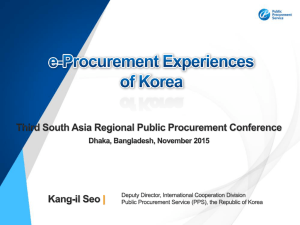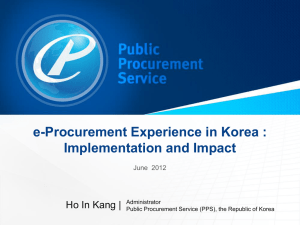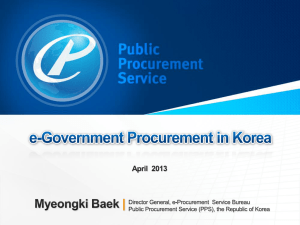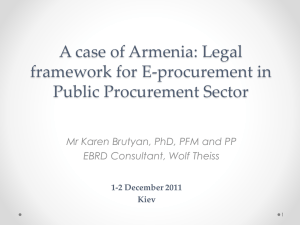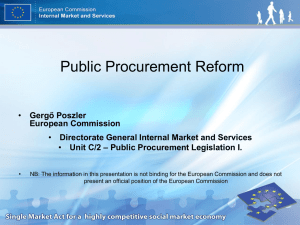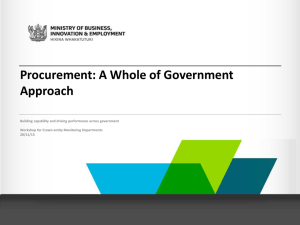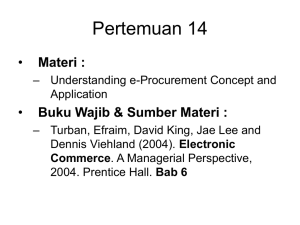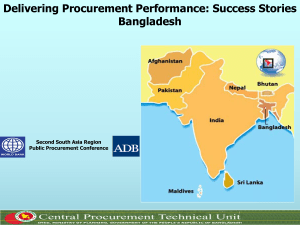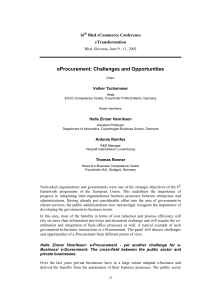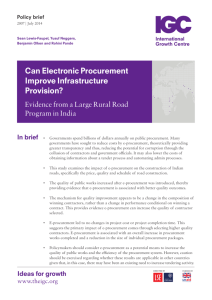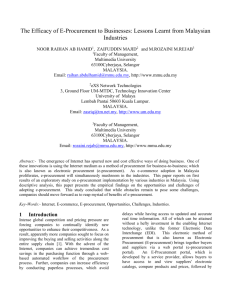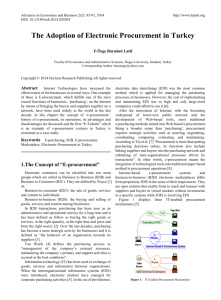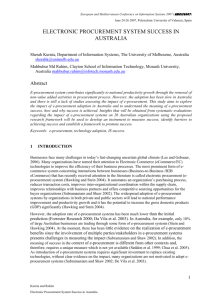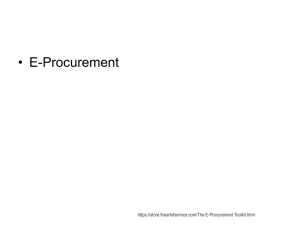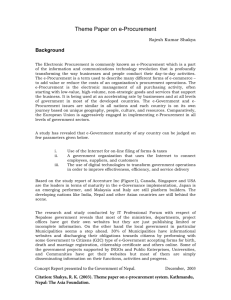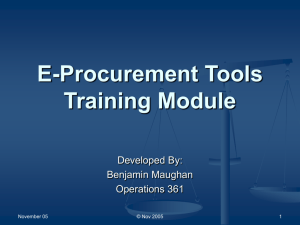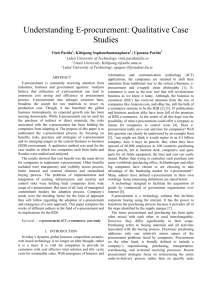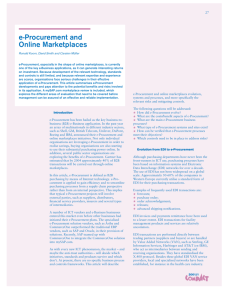슬라이드 1
advertisement
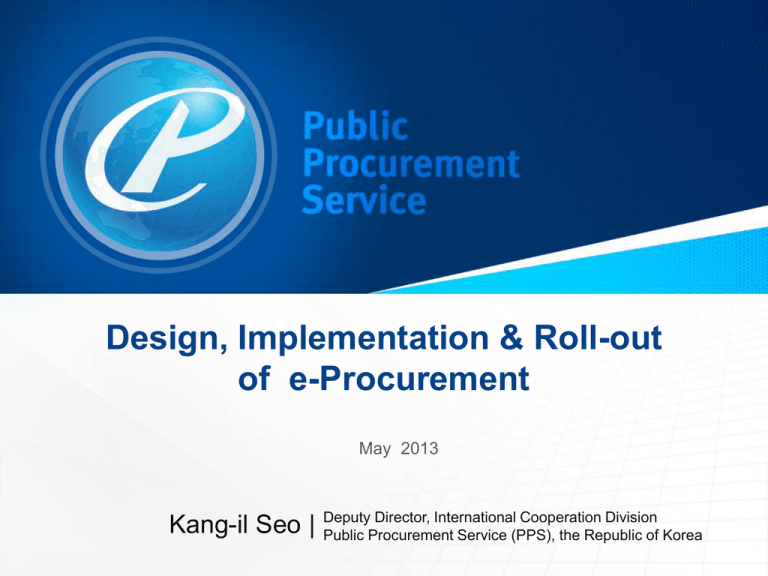
Design, Implementation & Roll-out of e-Procurement May 2013 Kang-il Seo | Deputy Director, International Cooperation Division Public Procurement Service (PPS), the Republic of Korea Contents Ⅰ. e-Procurement in Korea Ⅱ. How did we get here? - Choosing the model & consideration factors - What’s in the law? - the Roll-out Ⅲ. Impact of e-Procurement e-Procurement in Korea Korea Online e-Procurement System (KONEPS) KONEPS is the single portal for public procurement info in Korea End-to-end Functional Coverage KONEPS processes the entire procurement procedures through sub-systems: e-bidding, e-contracting, e-ordering from online shopping mall and e-payment “KONEPS” Korea ON-line E-Procurement System e-Notice e-Bidding e-Bidding e-Contracting e-Payment Online Shopping Mall e-Ordering e-Procurement in Korea In 2012, 66% of Korea’s total public procurement($101 billion) was conducted through KONEPS User Registration e-Bidding • 45,000 government agencies • 244,000 registered businesses • 93% of all bids are conducted online • 24M bidders participated in 292T e-bidding • Total transaction value : $42 billion e-Contracting & e-Payment • 657T contracts are electronic(99% of all contracts) • 100% of all payments are electronic Online Sopping mall • 500T Purchase Orders issued online(99% of all POs) • Total e-Mall transaction value : $12.5 billion 2 e-Procurement in Korea One Stop Service through Data Integration KONEPS exchanges data with 140 external info systems for supplier information, bid evaluation, bonds and payment, minimizing paper document submissions Before Public Buyer Bid Ministry of Strategy and Finance Industry Associations Supplier Surety Companies National Tax Office Construction Authorities Credit Rating Companies CertificationRelated agencies e-Procurement in Korea One Stop Service through Data Integration KONEPS exchanges data with 140 external info systems for supplier information, bid evaluation, bonds and payment, minimizing paper document submissions After Contract Delivery Ministry of Strategy and Finance Industry Associations Public Buyer Credit Rating Company National Tax Office KONEPS Construction Authorities Surety Companies e-Bid CertificationRelated agencies Supplier Korea Financial Telecommunications & Clearings Institute Choosing e-GP Model e-Procurement System Procurement process involves the exchange of information, agreement (negotiation and contracting), and settlement (delivery and payment). e-Procurement system is an intermediary that enables online processing of these activities Intermediary Buyer Information Exchange Agreement Settlement Electronic platform Supplier Choosing e-GP Model State Investment vs. Public Private Partnership PPP Complete outsourcing (development & operation) Hidden costs - Risk of lock-in effect (limits competition) Need dispute settlement mechanism (service fees, etc.) State Investment Government’s operation (facility management outsourcing) Needs operating agency with expertise in public procurement Certain level of internalization of technological resources Easier to share govt. administrative database Choosing e-GP Model Harmonization with e-Govt. Plan Government e-Procurement system was implemented as one of 11 e-Govt. projects Choosing e-GP Model Setting the Goals Single Window for Public Procurement All public tender notices and related information at a single website Bidders can participate in all public biddings after one-time registration Digitalization of Entire Procurement Cycle Entire procurement processes from supplier registration, bidding through to payment are conducted via the internet Integration with Other Information Systems Maximize the impact of digitalization by using database available at other public authorities Choosing e-GP Model Gateway to Government Procurement Integrated Information & Shared Use E-Procurement Portal Comprehensive Information Contents Integrated Information Search Customer Service Comprehensive information on public bids and bid awarding Access to data from public authorities and industry associations Shared use of information Standardized Procurement Process Standardization of Data ASP for public institutions Services for suppliers System development for the System Operation Authority Efficient Procurement Process One-time registration for participating in all public bids Reducing the paper document submissions by bidders Integrated e-GP System Standardizing Product Catalog based on UNSPSC Creation of e-Catalog Standardizing 149 e-Document forms Reliable e-Document Exchange Conformity to ebXML international standards End-To-End security measures with PKI encryption Security assurance Legal Framework Governing Laws (1) No separate primary legislation for e-Procurement until Feb. 2013 e-GP was rolled out without mandatory-use provisions (except tender notice) Legal Framework Governing Laws (2) e-GP could be implemented under existing laws on e-Commerce Rolling Out Training and User Support • Nation-wide training sessions • Marketing visits to public entities • Web Call-Center - 60 staff offering 4,585 consultations daily via phone and video-conferencing In the early onset of e-Bidding, PPS held 130 training sessions in 2001 and operated training courses at 23 locations 98% Incentives • Discount for service fees when procurement request is made via KONEPS • e-GP usage was included in the governmentwide performance evaluation criteria (‘05’09) 40% 20% 2002 2006 2010 e-Contracting Ratio Impact of e-Procurement Increased Transparency Real-time information disclosure - Bidding results and contract details disclosed to the public on-line - Peer monitoring on fair results Objectivity in bid evaluation - Bid evaluation based on objective, validated data Informed decision-making - Traceable prices and specifications - Reduced risks of biased decisions from information asymmetry 12 Impact of e-Procurement Transaction Cost Savings KONEPS is saving transaction costs of USD 8 billion annually Transaction Cost Savings - Reduced visits - Reduced labor costs - Private Sector : USD 6.6 billion - Public Sector : USD 1.4 billion $ 6.6 bn Increased efficiency - Receiving bids, validating related docs. and selecting the winning bid Before over 30 hrs After less than 2 hrs - Reduced lead-time - Streamlined Process $ 1.4 bn - Reduction of 7.8 million pages of paper documents per year Public Sector Private Sector 13 THANK YOU
